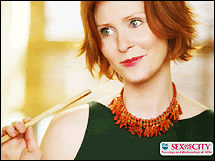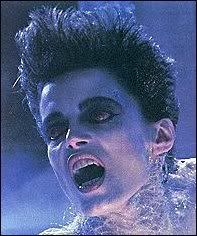"Sex and the City" is a dangerous show for women and an infuriating show for men and it's going to live on in infamy.
I'm sure of it.
Before I delved into entire seasons of the show, I assumed "Sex and the City" was the female equivalent of "Entourage."
Wealthy men buy pool tables, shiny cars and bigass televisions.
Wealthy women buy shoes, shiny jewelry and bigass purses.
There is a jubliance and laughability in "Entourage" that seems absent from "Sex and the City", despite both shows being half-hour HBO comedies. There is an edge of fear and anger in "Sex and the City" that isn't in "Entourage" or most any comedies, for that matter.
Episode after episode, the quartet of New York socialites "Forrest Gump" their way from man to man to man, finding neurotically 'Seinfeld'-ian reasons to drop them all, buy another pair of shoes, a gallon or ice cream and talk about how bad the guy was in bed.
The characters in "Sex and the City" strike me not as confident and strong, but confused, defensive and uncertain of what they want. And this seems to be the fork-in-the-road at which men and women split. The iconography of this feminine grouping suggest a role model relationship with many of the shows fans. Indeed, few would argue against the hook of the show being female independence, self-satisfaction, self-sufficiency, all-around success and fabulous shoes.
Their jobs are elite. They don't need a man to pay for things.
They're strong-willed enough that men are appropriated for sport rather than intimacy.
There are no more important relationships than the ones forged by these four friends.
Happiness comes in the form of shopping, food, parties or sex.
Me thinks thy fairest gender doth protest too much. These four running themes of the show may be what the characters are selling, but I ain't buying it.
Looking back on six seasons of romantic debauchery, these women were rarely happy, certainly never operating on much more than fleeting contentments. These professional women only sparingly focused on their jobs (as far as the context of the show goes), leaving the viewer to define them, not by their work or their professional interests, but by their primarily vapid, cold and childish social existences. Like children stomping their feet and whining that they are old enough to do whatever they want, these women harp so shrilly on the idea that they don't need men, children or professional identity in order to secure happiness, femininity or self-respect, that there protestations fall on deafened ears.
I'm not claiming this idea is generally fruitless, but I am claiming this idea is a lie when the ladies from "Sex and the City" tell it. With each passing episode, these four characters talked and talked and talked about one philosophy while acting upon another.
Why are men considered the gender that lies?.
Several years ago, I was fascinated with a claim I've heard many women make regarding their "getting ready" habits. For a while, I was under the impression that when women chose their makeup and outfit in preparation for a night on the town, they did so to attract men. A large percentage of women scoffed at this assumption by claiming they were, in fact, dressing to impress their fellow females.
What follows is an amalgam of every conversation on this topic I've ever had with every girl I've befriended, dated or wanted to date.
Me: You mean, you're not trying to attact guys? Are you trying to attract
women?
Them: No. It's a confidence thing.
Me: You want to be confident around women? Men don't play a part?
Them: They play a small part, but we're not competing with men. We're competing with
women –
Me: -For the attention of men.
Them: Men, sure. Sometimes, I guess. But not completely. Men don't judge us like
women. Women are much stricter judges. They know what they're looking
for; what's cheap, what's cute, what's stylish, what's tacky...
Me: Okay. Let's say some girl thinks you look tacky. So what? You're uninterested in
being her friend and you're not interested in dating her, who cares what she
thinks?
Them: Again, it's a confidence thing. Most men don't care what you wear. They care
about how tall you are, how skinny you are, maybe just how drunk you are.
Clothes are important to women because clothes are under our control. If we're
short, have big tummys, stringy hair or bags under our eyes, sometimes
there's not a whole lot we can do about it.
Me: So if you can impress your competition with something you control, like clothes,
it somehow validates you? Because unlike cankles, you had a choice of with
which shoes to ornament your feet?
Them: Yeah kinda, but not really.*
Me: So, it has nothing to do with men?
Them: We don't want you to think we're ugly, but you don't judge us by the same
standards we judge ourselves.
Me: …And women have higher standards?
Them: Do you like it when girls wear ponytails, rock t-shirts and jogging shorts?
Me: Heck yeah.
Them: Then yes, women have higher standards.
1) Based on the above conversation, the popularity of 'The Bachelor' is baffling to me. 2) Women have a biblically deep-seeded hatred for one another. It's nasty and sharpened to a diamond-cutting edge. 3) Men are not important to women. Identity is important to women. Somewhere along the line, men became a part of helping to define a woman's identity.
For men, this sucks, because women will have many more identities throughout their lives than pairs of shoes.
The trouble with "Sex and the City" (if you are in the mindset that there is trouble with "Sex and the City") is that the show holds a mirror up to its viewers, and reflects back at them, a caricatured likeness; just accurate enough for many viewers not to note the inumerous inaccuracies. For better or for worse, New York is a crazy town full of insanity and heartbreak. For better or for worse, women fill gaping emotional voids with clothing accessories.** And for better or for worse, men are women's easiest scapegoats for describing that which makes them dissatisfied.
Men on that show are more innocent bystanders of this neurotic quartet than they are honest bogeymen. On the rare occasion one of them admits that it isn't necessarily a man drumming the rhythm to her dissatisfaction, the surrounding characters react as if the society of women has somehow been compromised.
To understand the nature of this society, we must first understand the members.




The four sides of the average woman? (from left to right) "the princess," "the brat," "the temptress," "the bitch."
Carrie is an inhibited socialite pining for the life of a metropolitan princess with a selfish man who, season after season, allows Carrie to be his punching bag (Mr. Big, duh), while genuinely mistreating (twice) a good man (Aiden). All in the magical search of her elusive 5th Avenue fairytale ending.
Charlotte is an intensely self-involved naïve rationalizing her way to momentary happiness like a child wanton of a cookie. Anything deviating from her idea of perfection is immediately flawed.
Samantha is simultaneously the least realistic character on the show and the character with the least aggressive outlook on the world. I hate her of course because she's hedonistically narcissistic and vapid. Samantha is written as if she were a scared woman deciding to act like an empty male stereotype in hopes of never being hurt. In season 3, when faced with a sudden illness, Samantha desperately wishes she had gotten married and returns to these feelings when she is diagnosed with breast cancer several seasons later. In season 4 she shares a healthy and monogamous relationship that made her happier than she normally found herself to be - of course, that relatiosnhip ended because the man couldn't handle monogamy, because y'know... every single man on earth cheats, right?
Miranda hates men. I don't know why. Men don't know why. Miranda doesn't know why. She's professionally successful and leverages that against her personal ideals as a means of justifying her frustration with why she happier. Frankly, Miranda seems as condeming of herself as she is the men surrounding her. Ironically, Miranda's unexplained absense of self-satisfaction is a more accurate portrayal of many men than Samantha's hedonism. Miranda expells much of her energy berating her friends for focusing so vehemently on the male gender, while simultaneously steaming about whatever failed male encounter she last had. In short, Miranda is a successfully intelligent person whose militant self-denial causes others (including her closest friends) to disregard her.
These are the protagonists of "Sex and the City;" the four faces of everywomanhood. We are asked to empathize with their love lives while excusing their neurosis. And in the process of doing this, we tacitly accept that it is normal for women to be disparaging of men, sheltered and wanton of reality.
But hey, that's New York, right?
The overwhelming popularity of the show suggests that not only do women accept these generally negative characterizations, but they applaud them.
Some would suggest that because it is women behaving like men, I am thus threatened.
Perhaps.
But I'd also be threatened by men behaving this way. What was the last show that unabashedly allowed four male characters to talk, think and act on every neurotic sexual and social impulse they had? "Entourage"? "Seinfeld"? "Bosom Buddies?"
Any recent show with men behaving badly portrays them as buffoons who eventually got what is coming to them. Not "Sex and the City". They create the majority of their own unhappiness and we are asked to shrug it off as a typical bohemian female existence.
Admittedly, the show is not only a collection of pathological referendums against men. "Sex and the City" could never have grabbed millions of interested fans without being smartly written, provocative at least somewhat accurate. Do not mistake my frustration with the show's content as a statement of it's worthlessness. No show that I can recall (although I never saw "Ally McBeal") has been able to capture the ideal of co-female companionship more warmly than the HBO serial, nor has any program offered a similar take on the postfeminine conception of hope, regret and empowerment.
But if each episode is sharpened to a cutting point, it is only the viewer that gets drawn and quartered by the mixed messages the characters carry throughout each season. The protagonists of this show, so ensconced in the idea of identity, never truly pause to figure out what their identity is.
I can hear it now, "Dude. Adam, relax. It's just a television show. It's 28 minutes of harmless entertainment about which you are in the process of writing 3,000 words. The show went off the air almost four years ago. Let it go."
I know, I know. I'm like a 14-year-old just discovering Led Zeppelin and asking his father if he's ever heard of them.
The problem is, I don't know of many more potent television shows than "Sex and the City". Many have been equally, if not more popular, but few have threatened to serve as a behavioral template. It would be harmless if women didn't emulate this behavior. It would be harmless if women didn't see some fun and excitement in treating men the same as shoes: cute obsessions that rarely make it past the new seasonal line.
It would be difficult to pinpoint specific examples of the show's stranglehold on American female society, but it is nevertheless as palpable as the smoke in a room set ablaze.
"Sex and the City" was a popular book because it touched upon something pre-existing in women, but the show became an instant hit because it acted as an iconic pied piper to millions of women unaware of how to be "fabulous". Twenty years ago, the word diva carried wholly negative connotations. How many young women, tongue only slightly planted in cheek, strive to become fierce 'n' fabulous divas? To be looked at as uncompromising and unapologetic?
"Sex and the City" plays the "man game", a game that women have been fighting to abolish for centuries. And by doing its part to level the playing field, it is helping to create a side of women that is no less despicable than the same powerful, uncompromising, unapologetic side men have stereotypically displayed for milleniums.
But it's a side I've never had. It's a side I've always felt should be destroyed, not counterbalanced in women; and certainly not celebrated in a serial of misandristic yuppies.
======================================================================
* This is a clever trick, girls have concocted. Even when you're desperately listening and clinging to their every word and formulating an analysis based on what they say – and often what they say begs to be filtered through analysis – you will never completely understand. Women will always, always, always tweak what you say. Sometimes you'll even catch them tweaking what you say by repeating a phrase you just used. When this happens (and it will), be sure to savor it. Don't let the conversation drift away from this; roll around in this moment like a pig in slop. Marinate in the glorious juice of seeing the women realize her mistake, regret it and immediately look around for an open door or window to which she might flee.
** Before you formulate a Women Against Adam Assembly (appropriately abbreviated to WAAA) because of this last comment, remember that Charlotte (Kristen Davis) expressed this very sentiment in the 12th episode of season 2.
For further exploration of this topic, I suggest checking this site: http://www.genders.org/g39/g39_negra.html. This article is more scholarly and passes less judgement than mine, but it's nowhere near as funny.


